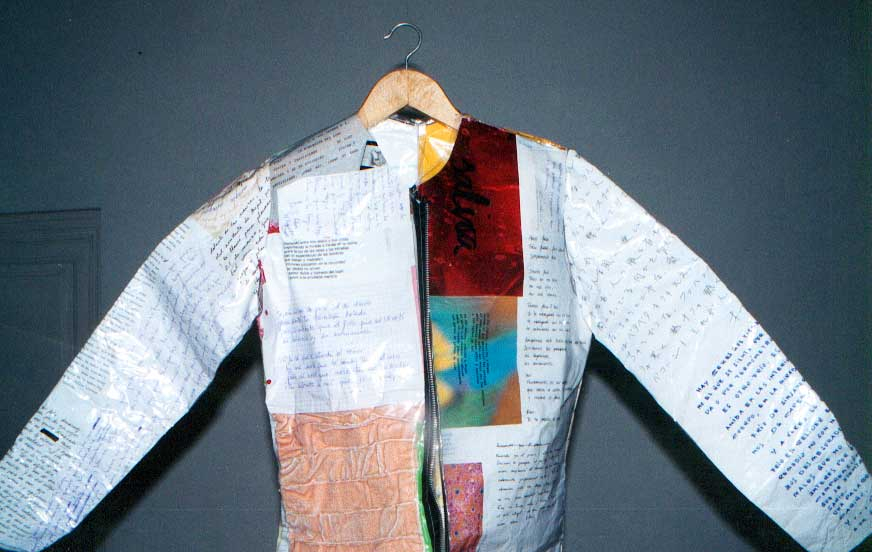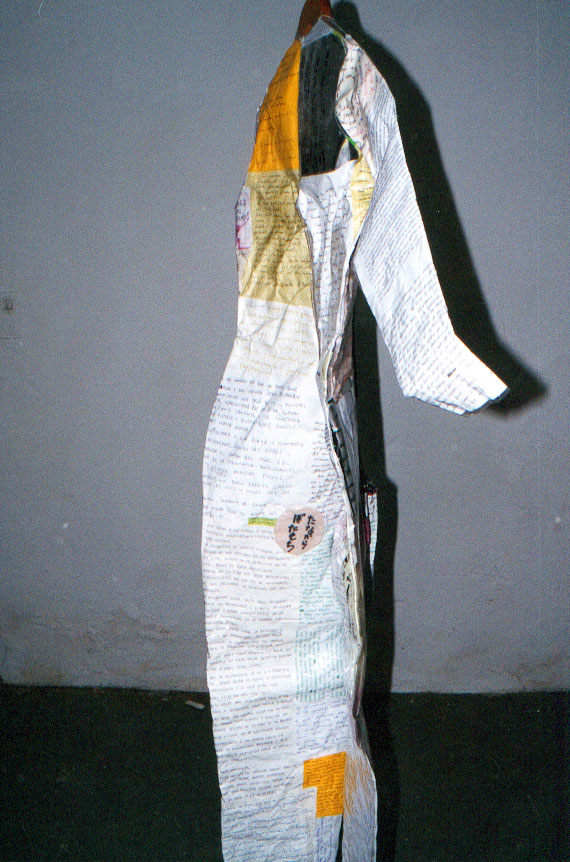Arropa'm. Installation
It has been quite clear for some time that artistic practice today has to a large extent been taking the body as its representational paradigm, possibly seeing the image of the human body as the most proper and legitimate human image, the image that calls out more readily to that which is human, that which describes us as relational beings and justifies us ethically, with the result that there is nothing better, nothing more effective, nothing more useful than understanding the world as the world of humanity. Humans represent humans in order to explain themselves. This art, therefore, explains to humans what they are and what they are not, which is one and the same thing. The image of man has become the essential visual voice for referring to everything that is human, to life, culture, to the awareness of modern times. Time seems have faded and the excessive, nay heroic, efforts directed at going beyond the human, at transcending one's condition and destiny seem to have vanished. Perhaps it looks to us as if that maniacal obsession, those episodes that stirred up cosmic visions that sought man's place in the machine of the Creation, that struggled to find man's place on the Orb by means of art and philosophy, were the poisonous effect of religion, the last influence of psychomotor beliefs tabulated in the mythological pantheon over the course of time and which originated in the primitive state of phenomenological animism that came before modern man.
We are therefore witnessing a new anthropocentric tendency, symptomatic of which are the artistic or para-artistic expressions referred to above, which developed in the post-modern wave of existential and cognitive over-action that evaluates every fragment and deems it to be fundamental but does not understand it as a part or chance linked to the monist web that sustains all existence that has emanated from a single pantheistic breath. Instead, this attempt to block the impossibility of utopia at a stable border, at a taboo frontier, sees the fragment and chance as evidence of the one true existence of mankind, of the only assessable and communicable level, that is to say, a level that can be questioned and is open to analysis, and, when all is said and done, ethically productive because it devises or aims to deploy a method on that which is real. Time is understood as the time of mankind, and things as the platform of cognition, the Universe as man's cognitive universe, and the breath or sensatory and chance substance of things as an event that emanates from their apprehensive metaboly, as the patrimony of their cognitive nature.
In these circumstances, we can point to a number of attitudes that seem to indicate fatigue with regard to the coercion exercised by the taboo: only that which is licit is possible, only that which is addressed at remedying contingency is ethical. Here we begin to see a certain set of symptoms described in more independent and more heteroclite attitudes. An individualism that is frequently more intuitive than reflective, disparate, imprecise, exposed to the wind and weather because it develops without the shelter of convention, beyond the confines of the agora.
This fatigue, to my mind, derives from the prostration to which this spiritual limit condemns, a spiritual limit that has attained spiritual mastery of the system. The symbolic pantheon is not merely a mansion of motionless statues, statues in the shadow of time; it is not just a chamber of fetishes but the place where the connection and the encounter between gross matter and awareness, between active and dynamic phenomenology and psycho-emotional capture, is established. In the end, this place of collision, friction, irritation and criticism is the locus of creation; it is the space where contact is made with the original sources, with the gods of language, with the times of awakening. The topos of outopos becomes necessary, the poetic action of the deus ex machina essential.
Miquel García's work adopts a stance that seems to reveal the fatigue I mention, inasmuch as he does not talk of the body as a conductorial reference. Instead, he imagines a body made corporeal by transcribed emotions, a body of spiritual bodies, and not a body that vindicates a condition, not a body taken as a dialectical equation of contingency. He succeeds in eliding the body of identity, meaning that he grants totality to the part in a reductionism that has become obsessive. The values of the iconographic lack of concrete expression, the poetic urge, draw near to him and lead him -even though he uses the quest as a system- to a position that will in the future be capable of overturning the opaque and armoured influence of the paradigm. I will celebrate this voyage to a space of sensory saturation, of gravity in form and severe posture. The gratuitous anecdote expresses fleeting, transitory artifices, while he calls together the synthesis of thought and attains, in the praxis of art, a mastery of the faculty of linking opposites in units of sense.
Gabriel
Sponsors: Caja Madrid. Obra social
Sponsoring media: El País i Ràdio 4
Collaborate: Schilling




